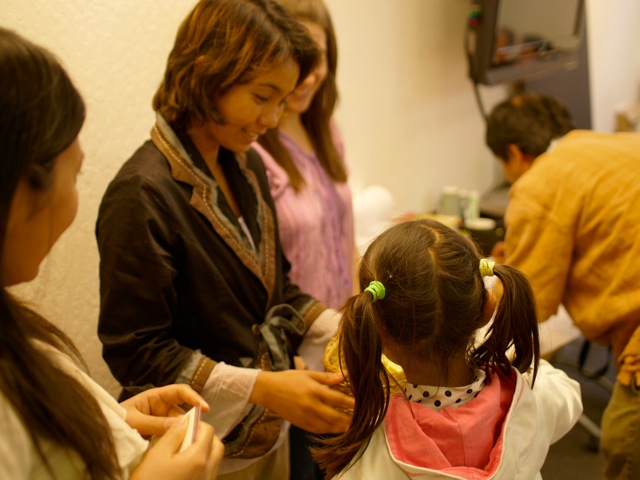Nwe Oo is quite familiar with the daily obstacles faced by Oakland’s Burma refugee population. Born on the Burma-Bangladesh border and a longtime resident of Thailand, she has experienced the challenges of transitioning to life in a foreign urban environment from a rural war-torn society.
She has also witnessed the stress within her community brought about by the resettlement process and the noticeable lack of health and wellness resources available to her approximately 400 fellow Burma refugees who are ethnically diverse, mostly Karen and Karenni, living in the East Bay.
It is because of her personal experiences, she says, that she is passionate about her role as CHAA’s Community Advocate for Burma refugee communities. As a team member of API Connections — an innovative program providing culturally competent health and wellness services to unserved and underserved populations — Oo is hopeful that her efforts will promote healthier behaviors in the Burma refugee community through methods of prevention and treatment.
“These refugees have come to build new lives, but are now facing a host of challenges, including emotional trauma,” Oo says. “They were driven from a land they loved and have lost friends, homes, and members of their families. The transition can not only lead to an unhealthy emotional state, but it can also lead to physical problems and cause an individual to isolate themselves, which is why our outreach work is so important.”
Eased with promises of an easier, safer, and healthier life by government and NGO officials, local Burma refugees have quickly learned the subjectivity of those terms. The transition from jungle refugee camps on the Thai/Burma border to a foreign, urban environment has been traumatic for many. Further, these refugees are also struggling with physical and mental health issues born from their experiences living in conflict areas.
“The challenges here are much more complicated than those in their native land, said Su Su Maung, Marriage and Family Therapist Intern/psychotherapist and board member of Burma Refugee Family Network (BRFN) “Most refugees were farmers or lived in rural areas, so they are new to the urban living and navigating these systems and institutions. There are now so many procedures to follow; in their native land, there are fewer procedures to follow. Also, the language barrier is huge, and not being able to read or speak or write in English is hard for anyone trying to navigate the systems here.”
Oo believes that for her community to be truly healthy, it needs support in a variety of areas. While mainstream medicine may be important, Oo also believes that health is influenced by other factors.
“The Burma refugee community needs a link to prevention, health education, screening, diagnoses, and treatment,” Oo said. “Further, they also need things that don’t fall under the mainstream medical model for health, such as quality education, community relationships, and support. It’s known that stress can aggravate isolation and lead to depression and anxiety and vice versa, so we want to make sure all these factors are addressed since they are all linked to well-being.”
Zar Ni Maung, board member of Burma Refugee Family Network, agrees that the diversity and depth of the challenges faced by refugees from Burma can lead to debilitating stresses related to acculturation to a new environment. However, because of a lack of English fluency and societal stigma, many of these issues simply go unrecognized and unaddressed.
“Many Burma refugees do not know how to navigate existing health issues they may have in their new environment, and the language barrier can make it very challenging to find out how,” Maung said. “In addition, the idea of mental and physical health being intertwined isn’t well developed in traditional Burma refugee culture, so educational workshops on overall wellness could be very beneficial for the community.”
In addition to providing the Burma refugee population with health resources, community leaders are serving as support and spreading healthy messages through workshops, trainings, consultation, events, cultural celebrations, and festivals. CHAA and the Burma Refugee Family Network, with other partners including Burmese Youth Association, Karen Culture and Tradition Committee and others, are coordinating efforts to become a consistent, trusted presence in the community. Efforts include, also, community-driven approaches to wellness, such as gardening (see Oakland Tribune article: http://www.insidebayarea.com/news/ci_16299545)
“My hope is that our community will be better able to collaborate effectively in unity around the various goals we would like to achieve for ourselves, and to address our community’s needs,” Maung said. “My hope is that our community can be self-sufficient, integrated within ourselves and into the American culture, and be well-represented and advocated for in the United States, and that we can also preserve our own unique culture(s) for the next generation to come so that we can create a home here for ourselves.”
While it won’t be an easy task, Oo is hopeful that API Connections and local leaders will lead to Maung’s vision of self-sufficiency and integration.
“I want to help the community become more engaged — and I think it can be — which is why I’m excited to be part of this project,” Oo said. “I’ve always wanted to work internationally, and I’m glad I can help them connect with one another here and serve as a source of much needed support.”
About API Connections
photo: Sean Kirkpatrick

